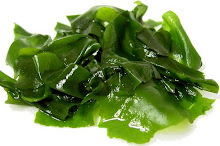Some answers to my questions:
- Q: Who shouldn't eat sea vegetables?
People who can't tolerate heavy metals (like arsenic) should avoid kelp SVs supplements. Supplements contain a more concentrated form of the vegetables and a more concentrated amount of arsenic. Even supplements from really high quality health food stores & companies have been found to have really high levels of arsenic in them. - Q: Where should people get sea vegetables?
SV grown in Mendocino are really high quality even despite the local water pollution because of the direction of the tides. Also, try to get organic SVs if you can. - Q: What about water pollution?
Try to get the dried/fresh SVs from the best sources you can, but don't worry too much about pollution if you're getting it from a reputable source (preferably west coast) unless you're taking supplements (see above). - Q: What about iodine in sea vegetables and overall health?
70% of U.S. population (at least) are iodine deficient and every glandular part of the body needs iodine to function properly. Eating SVs help clear up iodine problems (listen to podcast for specifics). Iodine in SVs is better than iodine in salt which is hard to absorb and utilize by the body and not enough for the body tissues to remain healthy. - Q: In terms of thyroid problems how can SVs help?
SVs can help hypo/hyperactive thyroids, but should be done under the care of a medical practioner. In small children, small amounts of SV (like in miso soup) are ok, but not iodine supplements. - Q: Cooked or raw?
Cooked is better than raw and easier for most people to eat. SVs in soups are great because cooking + soaking tenderizes them.

